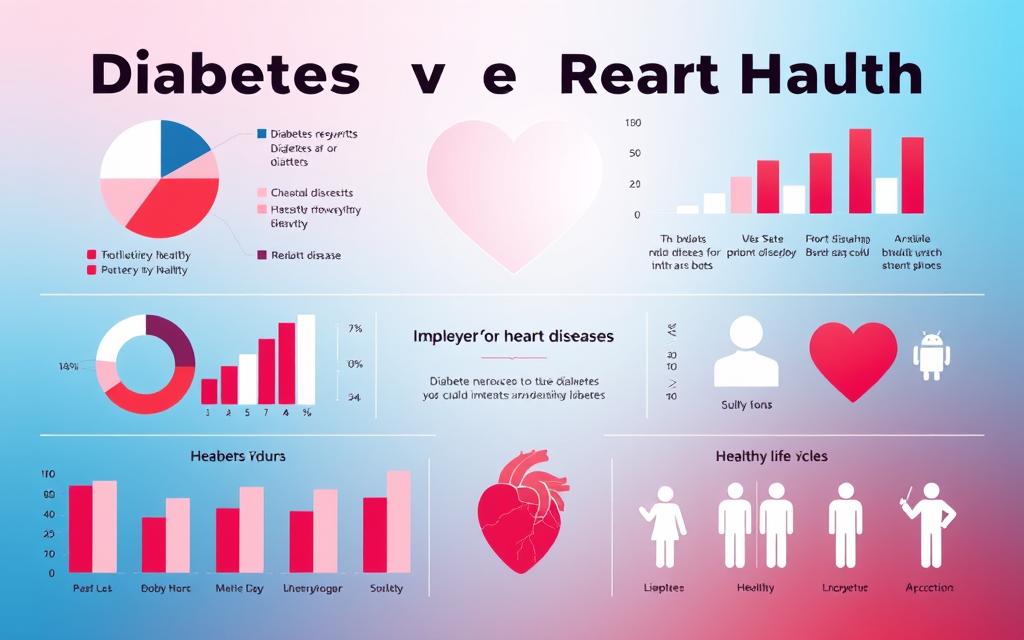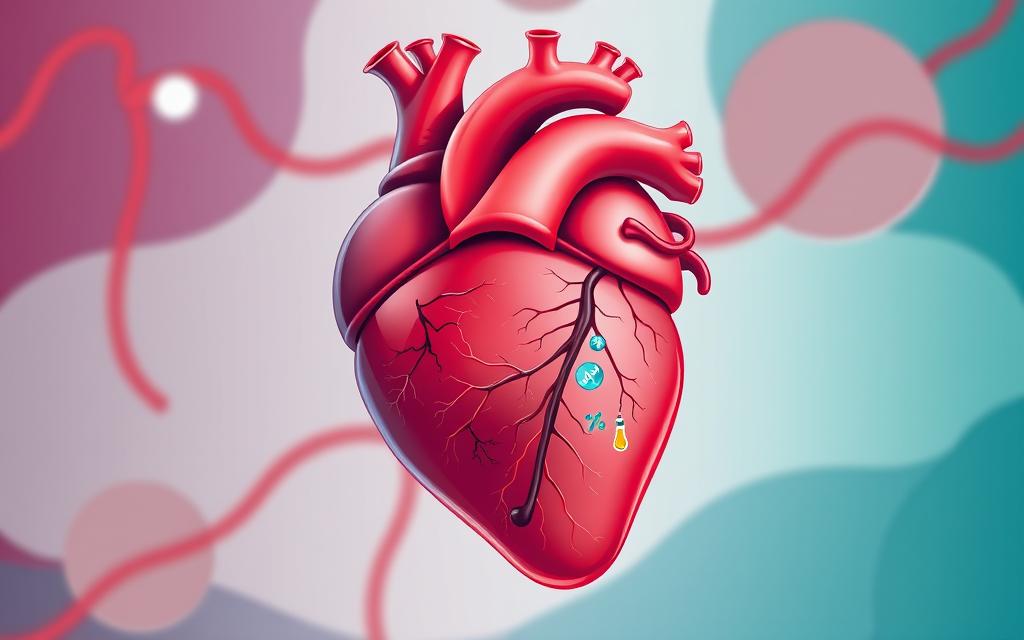When we hear “diabetes,” we often think of fear and determination. It might remind us of a family member’s battle or our own. Dealing with diabetes is more than just controlling blood sugar. It’s a journey that affects our heart health too.
Statistics show a scary truth: people with diabetes are almost twice as likely to get heart disease as those without it1. This link is serious, but it shows how important it is to take care of our health. By understanding how diabetes and heart disease are connected, we can take better care of our hearts and lives.
Key Takeaways
- Heart disease is a leading cause of death among individuals with diabetes.
- Maintaining blood pressure below 140/90 mm Hg is vital for reducing heart disease risk.
- Diabetes dramatically increases the likelihood of developing cardiovascular complications.
- Managing obesity through lifestyle changes is crucial for diabetes management and heart health.
- Regular monitoring of blood sugar levels can help protect overall heart health.
- A healthy diet plays a significant role in both diabetes and heart disease management.
Understanding the Connection Between Diabetes and Heart Disease
The link between diabetes and heart disease is deep and important. People with diabetes are about twice as likely to get heart disease as those without it2. Conditions like high blood pressure and high cholesterol add to the risk, making heart health worse3. High blood sugar can damage blood vessels and nerves needed for heart function, raising the risk of heart attack or stroke3.
Heart disease is the top killer for those with type 2 diabetes4. The CDC says people with diabetes face a 70% higher risk of dying from heart disease than those without it4. About 32% of type 2 diabetes patients also have heart disease4. Keeping blood sugar and blood pressure in check is key to reducing these risks2.
Changing our lifestyle to better manage diabetes is crucial to prevent heart disease. Eating too much sugar and unhealthy fats can worsen these risks, harming our health3. Regular exercise, at least 150 minutes a week, helps lower heart disease risks for diabetics3. By grasping these connections, we can make choices that help our heart health despite diabetes challenges.
The Statistics: Diabetes and Heart Health Risks
Recent diabetes statistics show a worrying trend. In 2022, about 38.4 million people in the U.S. had diabetes, which is 11.6% of the population. This is a big jump from previous years5. Adults with diabetes face a higher risk of heart health risks and cardiovascular disease, being 2 to 4 times more likely than those without diabetes6.
The number of people with diabetes has grown from 200 million in 1990 to 830 million by 2022. This is a concerning increase in global prevalence7. High blood glucose levels also caused around 11% of cardiovascular disease deaths7. Diagnoses are happening at younger ages, making diabetes-related health issues more complex.
In 2021, diabetes led to 1.6 million deaths directly, affecting mostly those under 70 years old7. About 29% of adults aged 65 and older have diabetes. This highlights the need for urgent action to lower heart health risks linked to diabetes5. It’s crucial to raise awareness and educate people about the strong connection between diabetes and heart conditions.
| Statistic | Data |
|---|---|
| Adults with diabetes in the U.S. | 38.4 million (11.6% of the population) |
| Increase in diabetes prevalence (2001-2020) | From 10.3% to 13.2% |
| Diabetes-related deaths (2021) | 1.6 million direct deaths |
| Cardiovascular disease risk increase | 2 to 4 times higher for diabetics |
| Adults with diabetes aged 65+ | 29% |

How Insulin Resistance Influences Heart Health
It’s important to know how insulin resistance affects our heart. This condition makes our cells less responsive to insulin, causing blood sugar levels to rise. This can lead to inflammation and oxidative stress, which harm our heart.
Being overweight or having high triglycerides increases the risk of heart disease8. High blood pressure, often linked to insulin resistance, can also cause heart problems8. People with insulin resistance may have blood that clots more easily, raising the risk of heart attacks8.
The Insulin Resistance Atherosclerosis Study (IRAS) found a strong link between insulin resistance and heart disease8. Even a small increase in blood sugar levels can increase heart disease risk by 18%9. People with diabetes often have high cholesterol, which is bad for the heart9.
Making lifestyle changes can help. Regular exercise and managing weight can lower blood pressure and blood sugar, improving heart health9. By focusing on diet and exercise, we can fight insulin resistance and protect our heart.
Type 2 Diabetes: A Major Risk Factor
Type 2 diabetes is a big risk for heart disease. It’s linked to obesity, high blood pressure, and bad cholesterol. The number of people with type 2 diabetes is going up, affecting more older adults and even kids as obesity grows10.
People over 35 face a higher risk of getting this disease, which hurts their heart health10. About 80% of those with type 2 diabetes are overweight or obese. This shows how important weight is in diabetes risk11.
Having a waist over 40 inches for men or 35 inches for women raises diabetes risk. This is key for checking heart health1011. It’s important to be active, aiming for 150 minutes of exercise a week to lower this risk10. Family history also plays a big role, making early action crucial if diabetes runs in your family11.
Knowing these risks helps us take steps to prevent them. Losing weight can greatly reduce the risk of getting type 2 diabetes10. By focusing on our health, we can protect our hearts from disease.

Managing Blood Sugar Levels for Heart Protection
Keeping blood sugar in check is key for heart health in people with diabetes. It’s important to watch glucose levels closely to lower heart risks. People with diabetes are more likely to get heart disease than those without it12.
Checking blood sugar often helps control diabetes and prevent heart problems.
Importance of Regular Monitoring
Checking glucose levels regularly helps adjust treatment plans on time. Studies show managing diabetes well can cut heart disease risk by 30-40%12. It’s crucial to keep blood sugar under 180 mg/dL after meals to protect the heart12.
Checking blood sugar before and after meals and during exercise is also important for heart health.
Strategies to Maintain Healthy Glucose Levels
There are many ways to keep glucose levels healthy. Regular exercise, like a 30-minute walk daily, can lower heart disease risks13. The American Diabetes Association suggests 150 minutes of moderate exercise weekly12.
Even light exercise helps control diabetes. Eating a diet full of whole foods and low in refined carbs can also reduce heart risks by 25-30%12. Taking medications as prescribed is also key, as 30% of type 2 diabetes patients need insulin12.
| Strategy | Description | Benefit |
|---|---|---|
| Regular Monitoring | Frequent checking of blood sugar levels. | Helps in timely adjustments to treatment and lifestyle. |
| Consistent Exercise | At least 150 minutes of moderate aerobic activity weekly. | Improves blood sugar control and cardiovascular health. |
| Balanced Diet | A diet low in refined carbohydrates and high in whole foods. | Stabilizes blood sugar and reduces heart disease risk. |
| Medication Adherence | Following prescriptions for blood sugar management. | Effective control of diabetes, preventing heart complications. |
By combining these strategies, we can greatly improve heart health and manage blood sugar levels1213.
Impact of High Blood Pressure on Heart Health
High blood pressure, or hypertension, is a big health risk, even more so for those with diabetes. People with diabetes are twice as likely to have high blood pressure as those without14. High blood pressure can harm the heart, leading to heart disease and stroke.
Having both diabetes and high blood pressure makes heart disease four times more likely14. About two-thirds of adults with diabetes have high blood pressure or take medication for it14. High blood pressure in adults is defined as a systolic pressure of 140 mm Hg or higher or a diastolic pressure of 90 mm Hg or higher15.
High blood pressure can cause serious problems like coronary artery disease. This disease damages the arteries that supply blood to the heart. It can lead to angina, heart failure, or an enlarged left ventricle, increasing the risk of heart attacks15. Diabetes and high blood pressure together can also cause kidney damage and retinopathy, common in diabetic patients15.

Cholesterol Levels and Their Role in Diabetes Management
Knowing our cholesterol levels is key to managing diabetes well. People with diabetes often have high LDL cholesterol and low HDL cholesterol. This mix raises the risk of heart disease, so it’s important to keep an eye on these levels.
Understanding LDL and HDL Cholesterol
LDL cholesterol, or “bad” cholesterol, can clog arteries and increase heart disease risk. On the other hand, HDL cholesterol, or “good” cholesterol, helps clear LDL from the blood. The National Library of Medicine suggests that adults should aim for LDL under 100 mg/dl and HDL of 40 mg/dl or higher for men, and 50 mg/dl or higher for women16. Knowing our cholesterol levels is crucial, even more so with diabetes.
Ways to Improve Cholesterol Levels
We can improve our cholesterol and heart health in several ways. Eating a diet full of fruits, veggies, whole grains, and healthy fats is key. Also, limit saturated fats and cholesterol to 200 mg a day16. Exercise is also vital; the CDC recommends 2 hours and 30 minutes of moderate activity weekly17. Activities like brisk walking can boost HDL and lower LDL.
Managing cholesterol is an ongoing effort that includes regular check-ups. People with diabetes need to have their cholesterol checked more often because of their higher risks. Even with controlled blood sugar, cholesterol levels may not be normal. Studies show that a controlled diet can cut LDL cholesterol by 22-33% in a month16. Also, getting dietary advice can lead to a 15% reduction in LDL over six months17.
The Role of Lifestyle Choices in Preventing Heart Disease
Lifestyle choices are key in preventing heart disease, which is a big challenge for those with diabetes. A healthy lifestyle can greatly lower our risk of heart disease and heart attacks. It’s a crucial focus18. Adults should do at least 2 hours and 30 minutes of moderate exercise each week18. Kids and teens should aim for 1 hour of activity daily.
Eating right is also vital for heart health. Diets high in sodium, sugar, and meats increase heart disease risk19. Quitting smoking is another important step, as it greatly lowers heart disease risk18.
Let’s look at some numbers: heart disease causes over 37% of deaths in the U.S. each year20. Making lifestyle changes can significantly reduce these risks. For example, losing 7% of body weight can cut diabetes risk by 58% compared to a placebo19.
We can summarize the importance of these lifestyle choices through the following table:
| Lifestyle Choice | Impact on Heart Disease | Recommendations |
|---|---|---|
| Regular Physical Activity | Reduces risk of CVD | 150 min/week moderate-intensity20 |
| Healthy Eating | Supports weight management and reduces morbidity | Limit sodium and sugar-sweetened beverages19 |
| Smoking Cessation | Decreases overall heart disease risk | Any effort to quit is beneficial18 |
| Regular Health Checkups | Monitors cholesterol and blood pressure levels | Check every 4 to 6 years18 |
Nutrition and the Diabetic Diet’s Influence on Heart Health
A well-planned diabetic diet is key for heart health and managing blood sugar. Choosing the right foods boosts our nutrition and well-being. Knowing which foods to pick and avoid helps us eat better for our hearts and diabetes.
Foods to Embrace for Heart Health
We should include these heart-healthy foods in our diet:
- Non-starchy vegetables: Half our plate should be these, like broccoli and spinach, for nutrients and weight control21.
- Lean proteins: Foods like fish and chicken should be 25% of our meals, supporting muscle health without extra fats22.
- Whole grains and fruits: Quality carbs, also 25% of our plate, keep blood sugar steady21.
- Healthy fats: Adding nuts and omega-3 fish twice a week lowers cholesterol, good for the heart21;23.
Foods to Avoid When Managing Diabetes
To manage diabetes and heart health, we must avoid certain foods:
- Processed foods: They have lots of sugars and unhealthy fats, raising heart disease risk and blood sugar issues.
- High-sodium items: Keep sodium intake under 2,300 mg daily to control blood pressure23.
- Saturated fats: Switching to healthier fats can cut heart disease risk by 25%21.
- Added sugars: Limit them to less than 10% of daily calories, as the American Diabetes Association suggests21.
By focusing on the right nutrition, we can greatly improve our heart health and manage blood sugar. A balanced diet can improve blood glucose control by 30-60%21. This reduces risks for diabetes and heart disease.
Challenges: Diabetic Neuropathy and Heart Health
Diabetic neuropathy is a big challenge for those with diabetes. It affects not just our daily lives but also our heart health. Up to 50% of people with diabetes face this issue, showing how widespread it is24.
This condition happens when high blood sugar damages nerves. It can harm the heart too25. The nerves controlling the heart and blood vessels may get damaged, raising our risk for heart disease.
Dealing with diabetic neuropathy means understanding its link to heart problems. Cardiovascular autonomic neuropathy (CAN) is a big risk factor for heart issues and sudden death, mainly in type 2 diabetes patients26. CAN affects 25% to 75% of type 2 diabetes patients, showing a strong connection25. The longer we have diabetes, the higher our chance of getting CAN, making regular checks and management key.

Managing diabetic neuropathy means keeping blood sugar levels in check. The American Diabetes Association (ADA) suggests yearly checks to catch problems early and protect our hearts24. Inflammation in diabetic patients is linked to nerve problems and heart issues26.
Keeping A1C levels under 7.0% is important to lower neuropathy risks24. To improve our health, it’s vital to grasp how diabetic neuropathy, heart health, and managing diabetes are connected.
The Link Between Diabetes and Chronic Kidney Disease
Chronic kidney disease (CKD) is a big worry for people with diabetes. It harms their heart health a lot. In the U.S., diabetes causes CKD in almost 15% of the population. People with diabetes are more than twice as likely to get kidney disease than those without it27.
Nearly 40 percent of people with diabetes will face kidney issues in their lives27. Also, kidney disease in people with diabetes greatly increases the risk for heart disease. This makes a scary link between these chronic conditions27.
CKD often starts slowly, with no symptoms for a long time. This is a key time for action, showing how important regular check-ups and good diabetes care are28. Keeping blood sugar levels in check is key for both avoiding diabetes complications and keeping kidneys and hearts healthy. It’s crucial to regularly check kidney health, including urine albumin and GFR tests, for those with diabetes27.
Making smart lifestyle choices and eating right can help prevent diabetes and CKD from getting worse. The American Kidney Health initiative is working towards this goal. It aims to lower kidney failure rates and encourage more home dialysis and kidney donations27. As we look ahead, staying alert and taking action is key to managing these health issues together.
Innovations in Clinical Trials for Diabetes and Heart Disease
We are at a key moment in diabetes research. Ongoing clinical trials are crucial in finding new ways to manage diabetes and lower heart disease risks. The Glycemia Reduction Approaches in Diabetes (GRADE) study is watching over 5,000 people with type 2 diabetes. They are testing different diabetes medicines29.
This study is changing how we treat diabetes. It helps make treatment plans better and improves health outcomes for patients.
The Look AHEAD study shows that people with obesity and type 2 diabetes can lose weight. They do this through healthy eating and more exercise29. The study found big improvements in how well people move and in their blood sugar, blood pressure, and cholesterol levels. This shows how important a healthy lifestyle is for heart disease innovations29.
Long-term studies like the Diabetes Control and Complications Trial (DCCT) and its follow-up, the Epidemiology of Diabetes Interventions and Complications (EDIC) study, have changed how we understand diabetes. They found that tight blood sugar control can prevent serious diabetes complications like eye, nerve, and kidney diseases29. The Diabetes Prevention Program (DPP) also showed that lifestyle changes can stop or delay type 2 diabetes in high-risk people29.
New medicines are also showing promise. The SURPASS trials are looking at tirzepatide. They found it lowers HbA1c, fasting serum glucose, and body weight compared to a placebo30. These studies offer hope for effective treatments and long-term heart health benefits30.
In our effort to link diabetes research with heart disease innovations, we see more evidence of weight loss with new medicines like tirzepatide30. This shows the importance of working together and keeping up with new research in healthcare.
| Clinical Trial | Focus/Outcome | Participants | Key Findings |
|---|---|---|---|
| GRADE | Assessing diabetes medications | 5,000+ | Effectiveness of various treatment options |
| Look AHEAD | Weight loss and diabetes management | Participants with obesity and type 2 diabetes | Improvements in physical mobility and reductions in glucose, blood pressure, and cholesterol |
| DCCT/EDIC | Intensive insulin treatment | Multiple cohorts | Reduces risk of diabetes-related complications |
| DPP | Preventing type 2 diabetes | High-risk individuals | Lifestyle modifications can prevent or delay onset |
| SURPASS Trials | Tirzepatide efficacy | Varied (478 to 1,995) | Significant reductions in HbA1c and body weight vs. placebo |
Conclusion
The link between diabetes and heart health is very important. It shows we need good ways to lower risks and improve our health. About 65% of adults with diabetes get heart disease or stroke31.
So, it’s key to watch our blood sugar, cholesterol, and blood pressure closely. These things can really affect our risk of serious problems from diabetes32.
Also, making healthy lifestyle choices can help a lot. Eating well and staying active can reduce our risk of diabetes and heart disease. People who are healthy and active do better with diabetes and heart health33.
Regular health checks and watching our conditions closely help us make smart choices. By taking care of our health in a complete way, we can aim for a future without diabetes and its dangers323133.
FAQ
What is the relationship between diabetes and heart disease?
People with diabetes, mainly type 2, face a higher risk of heart disease. High blood sugar harms blood vessels and nerves that control the heart. Managing diabetes well can improve heart health.
How does insulin resistance affect heart health?
Insulin resistance makes cells less responsive to insulin, leading to high blood sugar. This causes inflammation and oxidative stress, which can harm the heart. Diet and exercise can help manage insulin resistance and protect the heart.
What strategies can help manage blood sugar levels?
Keeping an eye on blood sugar, planning meals, staying active, and following medication are key. These steps help maintain healthy glucose levels, which is good for the heart.
Why is it important to monitor cholesterol levels in diabetes?
Checking cholesterol levels is crucial because high LDL (“bad”) cholesterol can cause atherosclerosis. HDL (“good”) cholesterol protects the heart. Better cholesterol levels lower the risk of heart disease in diabetics.
What lifestyle changes can help prevent heart disease in individuals with diabetes?
Regular exercise, balanced diet, and quitting smoking are key lifestyle changes. They can significantly lower the risk of heart disease, even for those with diabetes.
How does a well-planned diabetic diet influence heart health?
A well-planned diet for diabetes includes lean proteins, whole grains, fruits, and vegetables. It limits processed foods high in sugars and fats. This diet helps control blood sugar and supports heart health, making it crucial for managing diabetes.
What complications can diabetic neuropathy bring to heart health?
Diabetic neuropathy damages nerves due to high blood sugar, affecting heart and blood vessel control. This increases heart disease risk. Managing neuropathy and heart health together is essential.
What link exists between diabetes and chronic kidney disease?
About 40% of diabetes patients develop chronic kidney disease (CKD), which raises heart disease risk. Effective diabetes management is key to protecting both kidneys and heart.
How are clinical trials advancing the understanding of diabetes and heart health?
Ongoing clinical trials are vital for finding new ways to manage diabetes and heart risks. They explore new medications and lifestyle changes to reduce heart complications.
Source Links
- Diabetes, Heart Disease, & Stroke – NIDDK – https://www.niddk.nih.gov/health-information/diabetes/overview/preventing-problems/heart-disease-stroke
- Diabetes and heart disease | Heart Foundation – https://www.heartfoundation.org.au/your-heart/diabetes-and-heart-disease
- Diabetes and heart disease: What is the connection? – https://www.medicalnewstoday.com/articles/diabetes-heart-disease-connection
- What’s the Relationship Between Heart Disease and Diabetes? – https://www.healthline.com/health/type-2-diabetes/understanding-cv-disease-diabetes
- National Diabetes Statistics Report – https://www.cdc.gov/diabetes/php/data-research/index.html
- Diabetes and Heart Disease – https://www.hopkinsmedicine.org/health/conditions-and-diseases/diabetes/diabetes-and-heart-disease
- Diabetes – https://www.who.int/news-room/fact-sheets/detail/diabetes
- Insulin resistance and cardiovascular disease – https://pmc.ncbi.nlm.nih.gov/articles/PMC380256/
- Insulin Resistance and Your Heart – https://www.webmd.com/diabetes/insulin-resistance-heart
- Type 2 diabetes – Symptoms and causes – https://www.mayoclinic.org/diseases-conditions/type-2-diabetes/symptoms-causes/syc-20351193
- Risk Factors for Type 2 Diabetes – NIDDK – https://www.niddk.nih.gov/health-information/diabetes/overview/risk-factors-type-2-diabetes
- Diabetes management: How lifestyle, daily routine affect blood sugar – https://www.mayoclinic.org/diseases-conditions/diabetes/in-depth/diabetes-management/art-20047963
- Diabetes – preventing heart attack and stroke: MedlinePlus Medical Encyclopedia – https://medlineplus.gov/ency/patientinstructions/000080.htm
- Diabetes and High Blood Pressure – https://www.hopkinsmedicine.org/health/conditions-and-diseases/diabetes/diabetes-and-high-blood-pressure
- How high blood pressure can affect the body – https://www.mayoclinic.org/diseases-conditions/high-blood-pressure/in-depth/high-blood-pressure/art-20045868
- Cholesterol and diabetes: Relationship, levels, tips, and more – https://www.medicalnewstoday.com/articles/cholesterol-and-diabetes
- Cholesterol and Diabetes – https://www.heart.org/en/health-topics/diabetes/diabetes-complications-and-risks/cholesterol-abnormalities–diabetes
- Preventing Heart Disease – https://www.cdc.gov/heart-disease/prevention/index.html
- Lifestyle Modification for Diabetes and Heart Disease Prevention – StatPearls – https://www.ncbi.nlm.nih.gov/books/NBK585052/
- Lifestyle Strategies for Risk Factor Reduction, Prevention, and Treatment of Cardiovascular Disease – https://pmc.ncbi.nlm.nih.gov/articles/PMC6378495/
- Eating Well & Managing Diabetes – https://diabetes.org/food-nutrition/eating-healthy
- Diabetic diet: Dos, don’ts and meal plans to try – https://www.nebraskamed.com/diabetes/diabetic-diet-dos-donts-and-meal-plans-to-try
- Diabetes diet: Create your healthy-eating plan – https://www.mayoclinic.org/diseases-conditions/diabetes/in-depth/diabetes-diet/art-20044295
- An often preventable complication of diabetes-Diabetic neuropathy – Symptoms & causes – Mayo Clinic – https://www.mayoclinic.org/diseases-conditions/diabetic-neuropathy/symptoms-causes/syc-20371580
- Cardiac Autonomic Neuropathy in Diabetes Mellitus – https://pmc.ncbi.nlm.nih.gov/articles/PMC6369622/
- Diabetic cardiac autonomic neuropathy, inflammation and cardiovascular disease – https://pmc.ncbi.nlm.nih.gov/articles/PMC3580884/
- The Link Between Diabetes and Kidney Disease – Blog – NIDDK – https://www.niddk.nih.gov/health-information/professionals/diabetes-discoveries-practice/the-link-between-diabetes-and-kidney-disease
- The Bidirectional Link Between Diabetes and Kidney Disease: Mechanisms and Management – https://pmc.ncbi.nlm.nih.gov/articles/PMC10588295/
- Clinical Trials for Diabetes – NIDDK – https://www.niddk.nih.gov/health-information/diabetes/overview/clinical-trials
- Frontiers | Tirzepatide’s innovative applications in the management of type 2 diabetes and its future prospects in cardiovascular health – https://www.frontiersin.org/journals/pharmacology/articles/10.3389/fphar.2024.1453825/full
- Diabetes, its causes, its symptoms and conclusion – https://www.thcjbp.com/blog/diabetes-its-causes-its-symptoms-and-conclusion
- Summary and Conclusion – A Practical Guide to Diabetes-Related Eye Care – https://www.ncbi.nlm.nih.gov/books/NBK582430/
- The prevention and control the type-2 diabetes by changing lifestyle and dietary pattern – https://pmc.ncbi.nlm.nih.gov/articles/PMC3977406/
